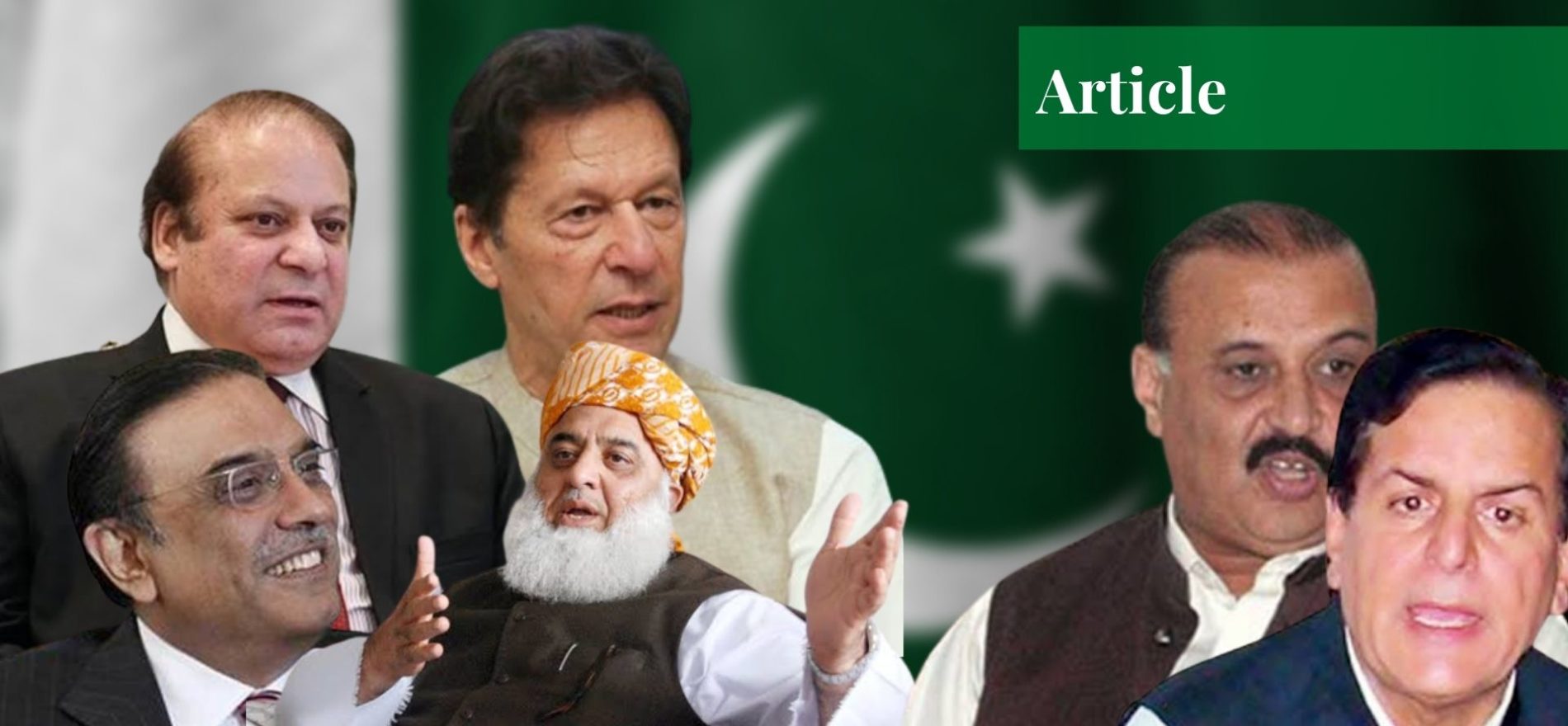Ms Afifa Iqbal has a keen interest in identity politics, colonialism and post-colonial development. She is currently working as a Research Assistant at ITU while pursuing her postgraduate studies in Development, Technology and Policy. She is a Gold Medalist in Political Science from the University of Punjab.
No-confidence Motion
Since the opposition has submitted the resolution calling for a motion of no-confidence against Prime Minister Imran Khan, there has been nothing but chaos in Pakistan’s politics. From the weaponization of political language to the storming of Sindh House by the PTI (Pakistan Tehreek-e-Insaf) workers, from hate-spewing Twitter spats between pro-Khan and anti-Khan accounts to the threats of social ostracization made against PTI defectors by Prime Minister Imran Khan, the citizenry has seen it all.
With the Ides of March approaching, the frenzied activity to hit the target is expected to increase manifold on both sides of the aisle. But the citizens of Pakistan need not worry because if history is of any relevance, then this chaos is business as usual. From defectors to the hybrid regime, and from the political chaos to the beleaguered Prime Minister, nothing is new. This tale is truly as old as Pakistan itself, with its origin in the Mughal era.
Historicizing the Current Moment in Pakistan’s Politics
The idea of politics as a moment/event in a long-winded story was outlined by the French political scientist Jean-François Bayart. In “Finishing with the Idea of the Third World: The Concept of the Political Trajectory,” Bayart postulates that the aforementioned story can be of civilization, inequality, culture, or a combination of any of these variables. Colin Leys neatly summarizes Bayart’s idea in The Rise and Fall of Development Theory as:
“The analysis of politics must, therefore, according to Bayart, try to link ‘the collective work of the production of the state to the subjective interiority of its actors’ by studying both the long-term historicity of a people, through which their political institutions have evolved, and the discourses through which these institutions are participated in and understood today.”
In this vein, the historical analysis of political institutions and the “discourses through which these institutions are participated in and understood today” is important for making sense of the present political situation. And it goes without saying that the present political crisis in Pakistan’s politics is a moment in the long-winded story of inequality and exploitation.
By taking the Mughal dynasty as the starting point, a fairly relevant genealogy of political institutions can be developed. Even if political institutions – as we know them today – were not established at that time, the proto-structures existed that encapsulated the personalistic nature of the Mughal dynasty.
Later on, when the British colonized the sub-continent, they delineated social groups along administrative lines, so these groups can help them in managing local affairs. In this vein, the Land Alienation Act of 1900 is often regarded as the “biggest act of social engineering” carried out in the sub-continent because it created powerful social groups that were linked together by mutual interest and survivalist instincts.
In other words, these groups were to serve as the mediators between the British Raj and the Indian populace by managing the local affairs in a manner that best suited the interests of the Raj. This delineation of social groups across administrative lines institutionalized the patron-client polity and economy that existed in dispersed form in the Mughal era. More so, the Raj also sowed the seeds of institutional imbalance that continue to plague Pakistan’s polity and society to this day.
After independence, the political institutions shaped by the colonial legacy operated largely via patron-client networks. Moreover, the institutional imbalance and delineation of social groups resulted in a perpetual tussle of power among those groups, injecting the element of instability within the very foundations of the political institutions of Pakistan. The post-partition history of political institutions lends credence to the aforementioned argument.
The participation in and understanding of the political institutions today is informed by this historical trend because the institutions have retained the personalistic element of the Mughal dynasty as well as the patron-client and extractive element of the British Raj. This has become part of their institutional memory.
Consequently, Pakistan’s politics have always remained in a state of political chaos, with a disgruntled political executive trying his best to save his seat by managing the institutional imbalance (either by accepting it like Imran Khan or by declaring open war against it like Zulfiqar Ali Bhutto) and keeping the members of his party from defecting when the going gets tough. Hence, the political equation has always remained unstable.
Political Instability of Pakistan: The Issue of Defectors
One comical manifestation of this institutional development is the issue of defectors. In the Mughal era, the personalistic nature of political proto-structures was such that defectors stood to benefit from crisis and were also in high demand in such times. Moving forward, the defectors played an important role in the establishment and consolidation of British rule in the sub-continent.
Where the likes of Mir Jafar and Mir Sadiq facilitated the establishment of the British Raj, the social groups of Punjab facilitated the consolidation of the British Raj in exchange for land, recruitment into armed services, and colonial titles. This trend has persisted even after independence.
The defectors have thrived during times of crisis and in many ways; the destabilizing and undemocratic forces were able to initiate the crisis because of the existence of defectors. Consequently, a perpetual cycle of political instability has been created in Pakistan. When one institution starts to feel that its grip on power is loosening, it starts courting and vowing potential and habitual defectors. The same is the case for social groups and political parties. The decade of 1990 epitomizes the gist of this power struggle.
In order to deal with this issue, the political participants leaned on the state’s constitution. But the way the Constitution of Pakistan deals with defectors is an embodiment of the personalism and patron-client nature of the political institutions built with the help of defectors. The 1973 Constitution did not have any clause to deal with defectors because Zulfiqar Ali Bhutto was arguably confident in his ability to deal with the defectors if the need arises.
After Nawaz Sharif suffered at the hands of the defectors, he introduced the 14th Amendment in a bid to make the government stable. But there was a personalist element to this amendment as the party leader had the effective power to disqualify a lawmaker. It is no secret that political parties in Pakistan have a strong dynastic and personalist element and that they rely heavily upon patron-client networks to get selected and to operate.
Afterward, General Pervez Musharraf – as he stood to benefit from defectors – introduced the revised version of article 63A via the 17th Amendment which put in place the qualified version of what constitutes defection. The 18th Amendment also introduced a revised version of article 63A without any substantial change because the political parties in power were the same who introduced the article in its original essence in the first place.
Genesis & Evolution of Political Chaos: The Role of Defectors
Since its inception, PTI positioned itself as an anti-dynastic, anti-corruption, and pro-people party. It seemed to hold onto this narrative for quite a period. However, the lead-up to the 2018 elections offers a different story. PTI actively sought and welcomed “electables” from the political parties that were accused of corruption and exploitation by party leader Imran Khan.
In fact, Prime Minister Imran Khan gloated about PML-N’s defectors from Punjab joining PTI just two months before the 2018 general elections. Even after the elections, Jahangir Tareen’s efforts to vow independence as well as PML-N (Pakistan Muslim League-N), PML-Q (Pakistan Muslim League-Q), and PPP (Pakistan People’s Party) lawmakers were lauded by PTI and Imran Khan. The following tweet was made from PTI’s official Twitter handle:
“Our star batsman. @JahangirKTareen in his full form. Punjab Assembly’s target has been achieved. Running between the wickets for National Assembly now. #PTI welcomes Umar Farooq from Bahawalnagar today.”
In fact, many notable PTI lawmakers have a career path that traverses through different political parties. From Fawad Chaudhary to Shafqat Mahmood, PTI is standing on the shoulders of defectors like any other party in the history of Pakistan.
Fast forward to today’s no-confidence motion, PTI is decrying the opportunism of the defectors while using every constitutional/unconstitutional tactic to bring the defectors back into the party’s fold and avert the no-confidence motion. No surprise there. All these tricks have already been used in Pakistan’s politics by lawmakers and political executives in the past to save their seats, but the inherent instability of the system rendered them unsuccessful.
In the present scenario, the speaker of the National Assembly, Asad Qaisar, has been accused of biased conduct by the opposition. The fact that he called the session of the National Assembly on 25th March—when the constitution only allowed for it to be conducted as late as 21st March—is not helping his case. As a legal scholar, Maryam Khan tweeted:
“Mr. Speaker just violated the Constitution. A potential Art. 6, if and when conditions allow. Imran Khan will not be watching his back when that happens (has he ever watched anyone’s back but his own?).”
Again this is nothing new. In the grand comical theatre that is Pakistan’s politics, speakers have been accused of biasness before. Moving forward, the defection of PTI lawmakers and the ruckus created by PTI workers and lawmakers in Sindh House, to bring the defectors back into the party’s fold, brings to mind the defections before the 2018 elections as well as the tactics used by Nawaz Sharif and Benazir Bhutto to stop the deserters from jeopardizing their rule in the 1990s.
Consequently, the threats of social ostracization made by Prime Minister Imran Khan may be more intense, but they again are part of the same old story. Having stated that, the historical context helps one in locating the current crisis in Pakistan’s politics in a complex story that is characterized by instability, defection, beleaguered executives, and hybrid regimes, and helps in treating these unstable circumstances in a business-as-usual manner.
Conclusion
The way the political institutions in Pakistan have evolved from the Mughal era and the British Raj, and the way these institutions are participated in and understood today makes one realize that the present political crisis is not a novelty; it is as old as the system itself. The same is the case of defectors. The system built around and with the help of political defectors is not going to crash because of them. So, as stated earlier, the citizens should treat it as “business as usual” because the political equation is something like this:
Politics = Hybrid Regimes + Beleaguered Political Executive + Instability + Defectors
This stable instability is part and parcel of the political system of Pakistan.
If you want to submit your articles, research papers, and book reviews, please check the Submissions page.
The views and opinions expressed in this article/paper are the author’s own and do not necessarily reflect the editorial position of Paradigm Shift.



















